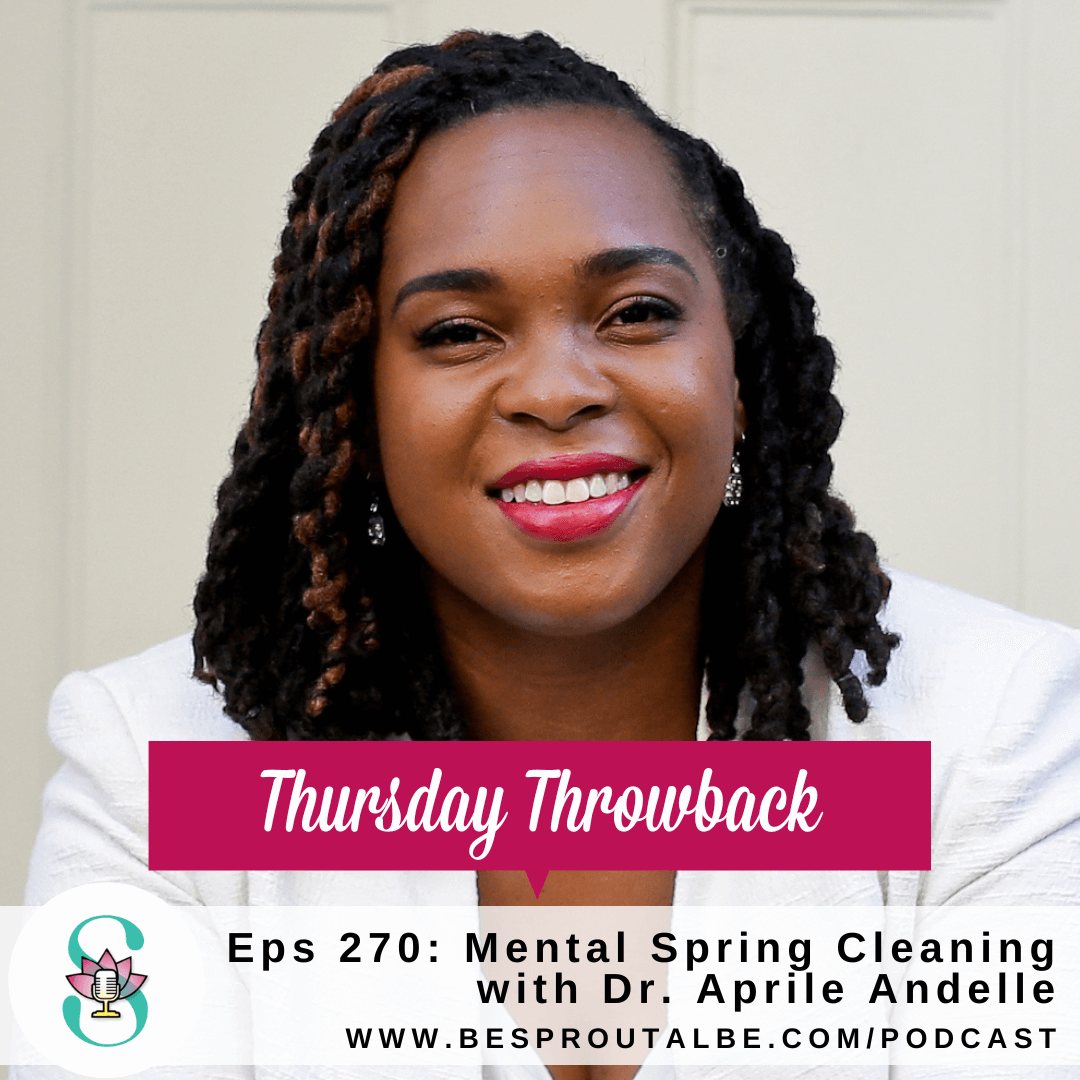THROWBACK THURSDAY: Eps 270 with Dr. Aprile Andelle

Thursday Throwback!
This week we are revisiting Episode 270. This show originally came out in April of 2021. Offers and products mentioned during the show are likely outdated.
Enjoy!
My guest is Dr. Aprile Andelle.
Dr. Andelle is a black woman licensed psychotherapist with over 9 years and 10,000+ hours of experience in “deep dive healing” work with amazing clients all around the world.
She hosts the ‘Do I Need Therapy™? Podcast Show available on Apple and Google Podcasts, Spotify, and Stitcher, and speaks to her community openly, loudly, and proudly about mental health, love and life, PLUS the process of therapy, and the strength found in asking for help.
She teaches amazing, highly ambitious women, and women of color, the skills of *long-lasting* positive mental health in overcoming stress, overwhelm, anxiety, depression, and trauma, including her “Every April” psychological spring cleaning course offered every springtime, in April to support the fierce, yet sensitive woman achieve positive mental health all year long.
She specializes in online and virtual therapy and offers mental wellness support for all through her mental health masterclasses, courses, and meditations.
She is a world traveler currently based in Miami, loves all things declutter and minimal lifestyle—except plants… She says, “you can never have too many plants and green stuff” — is described as “that unique kind of person who makes lifelong friends in 24 hours or less”, and can often be found on Instagram watching endless reels of laugh-out-loud, therapy memes and reenactments or enjoying a “deep, campfire-style” conversation on Clubhouse.
Where to find Aprile:
Community is everything!
Join our community Facebook groups:
Takeaways from the show

- Aprile’s journey to becoming a therapist
- Psychological cleaning program
- Maintaining a positive, steady state of mental health
- Feelings are temporary
- Think before you speak
- Responsive vs. reactive
- Inner voice
- Being inside of possibility vs. drowning in uncertainty
- 3 steps of psychological spring cleaning
- Vulnerability is what makes you brave
- Marie Kondo your mind
- Recommit to your goals
Where to find Aprile:
Mental Health Mini Summit
Parenting teenagers is hard work!
The Adolescent Mental Health Summit brings top experts to one place for supporting parents with the nuances of their teen’s mental health.
The topics covered in this mini summit are hard to talk about. Parents with teens that are going through mental health challenges often feel very alone and ashamed. My goal is to shine a light on these topics in a way that allows parents to feel more capable and informed – and to allow all parents to recognize there is no shame here, simply children that are doing the best they can with the tools they have.
The Adolescent Mental Health Mini Summit provides valuable information for parents around learning challenges, eating disorders, self harm, anxiety, depression, and more.
Go to besproutable.com/teens and click online teen courses to purchase!
Positive Discipline Association Conference
Join us in person for the 2022 Positive Discipline Conference which features presentations for educators, clinicians, and parents. Spend the day developing Positive Discipline tools for home and school, or to support others through your coaching, consulting, or counseling practice.
Learn more at positivediscipline.org
Teaching Parenting The Positive Discipline Way
Teaching Parenting The Positive Discipline Way is a two day, in-person workshop designed to support participants in learning all they need to teach the Parenting the Positive Discipline Way curriculum. Developed by Lynn Lott and Jane Nelsen, this program provides a step-by-step approach to starting and leading experientially based parenting groups and classes. This curriculum can stand alone or can offer significant enhancement to other parenting programs; it emphasizes experiential activities that reach the heart to inspire deeper understanding and change.
Grounded in the work of Jane Nelsen and Adlerian Theory, Positive Discipline centers relationship, encouragement and the practice of life skills, with an overarching theme of trusting the process and recognizing mistakes as opportunities to learn and grow.
This course takes place IN PERSON Fri May 27th – Sat May 28th
8:30am – 5pm ET in McLean, VA
Learn more at besproutable.com/parent-educators
Exclusive Offers for Listeners
Check out these offers and support the show while you support yourself and your family:
Better Help: www.betterhelp.com/joyfulcourage get 10% off your first month
Teen Counseling: https://teencounseling.com/jcteen get 10% off your first month
Troomi Wireless: www.troomi.com use “joyfulcourage” and get $50 off your first phone
Therapy Bootcamp: https://www.destinationyou.net/therapy-bootcamp use “Joyful” at checkout for $30 off tuition to the program
Subscribe to the PodcastWe are here for you
Join the email list
Join our email list! Joyful Courage is so much more than a podcast! Joyful Courage is the adolescent brand here at Sproutable. We bring support and community to parents of tweens and teens. Not a parent of a teen or tween? No worries, click on the button to sign up to the email list specifically cultivated for you: Preschool, school-aged, nannies, and teachers. We are here for everyone who loves and cares for children.
I'm in!Classes & coaching
I know that you love listening every week AND I want to encourage you to dig deeper into the learning with me, INVEST in your parenting journey. Casey O'Roarty, the Joyful Courage podcast host, offers classes and private coaching. See our current offerings.

